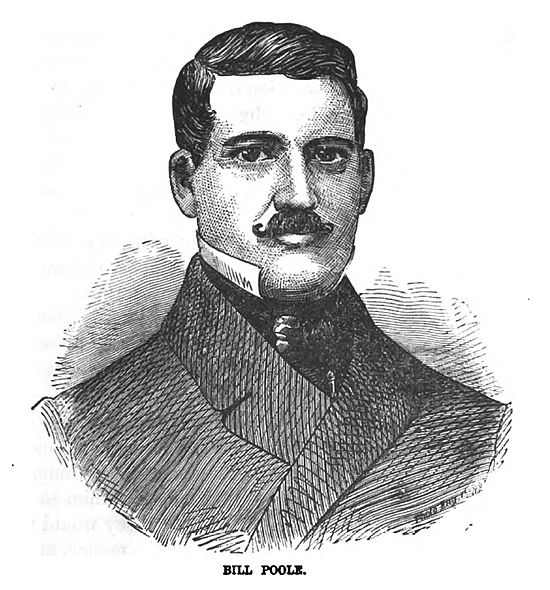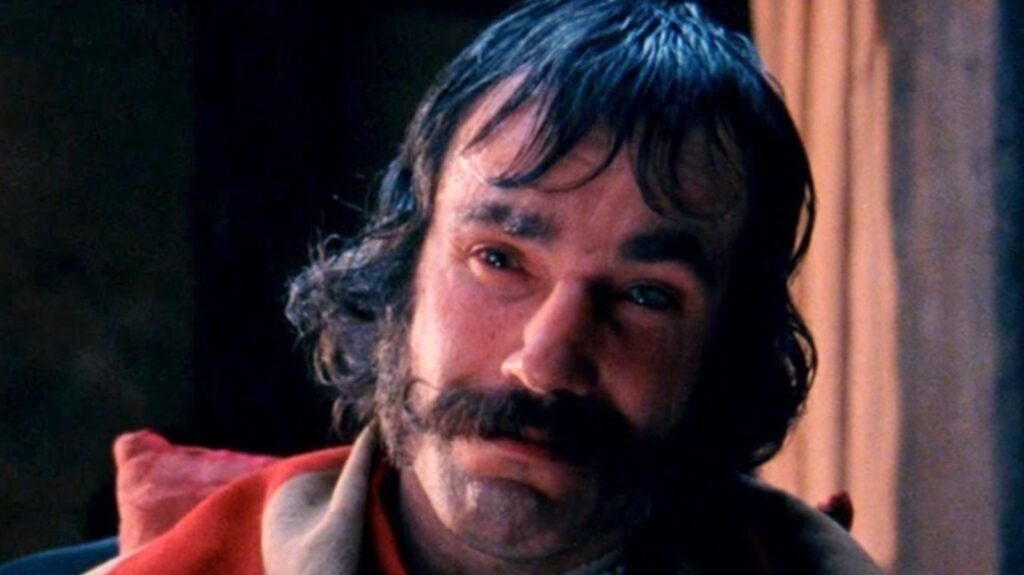William Poole, aka Bill the Butcher, was a fierce knife-wielding gang leader in 19th-century New York City. He led the nativist street gang Bowery Boys, went on to rule the criminal underworld, and later got into politics.
Bill’s larger-than-life presence was immortalized by actor Daniel Day-Lewis’ fictionalized portrayal of him as William “Bill the Butcher” Cutting in the 2002 film Gangs of New York, directed by Martin Scorsese.
But there is more to Bill’s life than just his charismatic personality and explosive nature.

The Early Life of Bill the Butcher
Bill was born in New Jersey on July 24, 1821, to English immigrants. Ten years later, his family relocated to New York City, and his father opened a butcher shop.
Eventually, Bill took up the reins of the shop, which was partly the reason for his nickname “Bill the Butcher.” He also went by that nickname as he was a bare-knuckle boxer who enjoyed bashing his rivals until they resembled bloody cuts of meat.
He was a dirty fighter known for gouging his opponents’ eyes out or chewing off their noses.
Bill’s career as a butcher sharpened his knife-wielding skills. These skills and his boxing experience shaped him into one of the most well-regarded street fighters in the country.
The Bowery Boys
Bill went on to lead the Bowery Boys, an anti-Irish and anti-Catholic street gang.
This gang operated from the crime-infested and disease-ridden Five Points neighborhood, one of the country’s most impoverished slums.
Like other street gangs, the Bowery Boys were not just a criminal organization.
Their members belonged to poor, neglected neighborhoods, and street gangs closed the gap created by the lack of social services.
These gangs gave members jobs like firefighting, which provided much-needed structure.
In the 1840s, Bill became a firefighter and joined the Howard Fire Engine Company #34. The Dead Rabbits, which was the biggest rival gang comprising Irish members, also ran fire brigades.
The gangs’ enmity manifested even in firefighting jobs. If both brigades were simultaneously at the scene of a fire, rival gangs would fight in the street even as the flames raged on.
And if the Bowery Boys arrived at a fire and could not put it out, they would ensure that the Dead Rabbits could not do so either.
A member of the Bowery Boys would put a barrel on the closest fire hydrant and sit on it, preventing access.
Nativists versus Immigrants
The first half of the 19th century saw Europeans immigrating to the United States in hordes. However, many “nativist” Americans, who were second and third-generation immigrants, despised this wave of immigration for ethnic and economic reasons.
They felt that these new immigrants would usurp their jobs and economic opportunities and oust them from the United States. Moreover, most immigrants were Catholic, while many nativists were Anglo-Saxon Protestants. This led to religious tension in the country.
By the 1850s, more than half of the population in New York City was Irish Catholic. Tammany Hall, a political organization that gave the Irish membership, milked the surge in migration to rule city politics.
The Dead Rabbits and other Irish Catholic street gangs had close links and voted for its leaders in exchange for food and money.
The Rise of the Know-Nothing Party
In 1849, Tammany Hall’s emergence made nativist Americans unite and form the Know-Nothing Party in New York City.
It originated from a secret society called the Order of the Star-Spangled Banner. The nativist party got its name because when outsiders questioned its members, they would answer, “I know nothing.”
The party widened its reach across the United States, and by 1855, 43 Congress members belonged to it. Bill was one of the earliest leaders of the party and was instrumental in spurring its members to vote against the Irish Catholics.
William Poole vs. John Morrissey
Bill’s arch-rival was John Morrissey, an Irish immigrant, and worker at Tammany Hall. Like Bill, he was a tall and tough bare-knuckle boxer. In addition, he was an emigrant runner for Tammany Hall and helped new immigrants become citizens and find jobs in exchange for their votes.
Moreover, like Bill, he was a shoulder-hitter on election days and would protect people from harassment and violence to allow them to cast their votes peacefully.
In the 1854 mayoral election, Bill and John stood against each other, defending their respective voters from each other’s meddling. This election saw the victory of the Tammany Hall candidate.
In the same year, Bill and John locked horns in an eagerly awaited boxing bout. Bill rained blows on John and won the match. But John’s followers protested that some of Bill’s supporters had assaulted John during the match. Nonetheless, the loss led to John starting to plot his payback.
William Poole Dies
Within a year of the boxing duel, John conspired with some members of the Dead Rabbits to kill Bill.
On February 25, 1855, Bill and John ran into each other at a New York City bar called Stanwix Hall. They threw insults at each other and then came to blows. When the authorities arrived, they took the duo to different police stations but let them go without pressing any charges.
Later, Bill returned to the bar and bumped into Tammany Hall associates Jim Turner and Lewis Baker. Another fight broke out, during which Baker shot Bill in the chest and Turner shot him in the leg.

The bullet wedged into his heart’s protective sac, and Bill died 11 days later on March 8, 1855.
Reportedly, Bill’s last words were, “Goodbye boys, I die a true American.”
His killing enraged nativists around the United States. Their outrage intensified on the acquittal of John and his accomplices in three separate trials.
Bill’s demise at the hands of Irish Catholic immigrants became a call to arms for nativists. He died a martyr for the cause, and his supporters largely turned a blind eye to his brutal, undemocratic ways.
On March 11, 1855, Bill was interred at the Green-Wood Cemetery in Brooklyn. His allies arrived in thousands to bid him farewell and participate in his funeral procession.
References/Citations
https://historydaily.org/bill-the-butcher-william-poole-bio-facts-trivia-you-didnt-know
https://www.history.com/topics/us-politics/tammany-hall
https://www.newworldencyclopedia.org/entry/Tammany_Hall
https://www.britannica.com/topic/Know-Nothing-party

